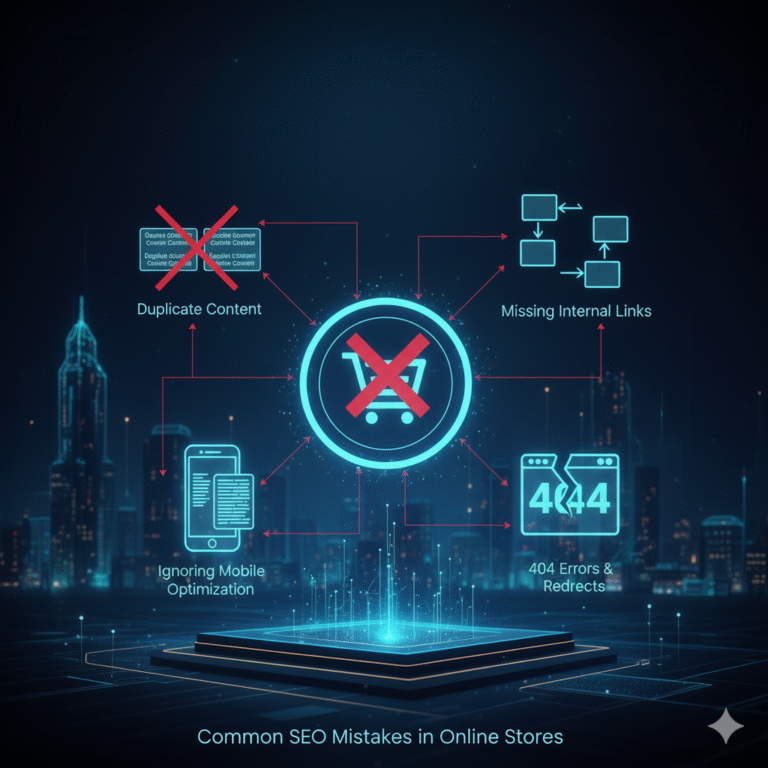The e-commerce industry is more competitive than ever. With millions of online stores competing for visibility, ranking higher on Google is essential to drive organic traffic and sales. According to Statista, global e-commerce sales are projected to surpass $8 trillion by 2027, making search engine optimization (SEO) a non-negotiable growth strategy.
At EcommBrains, we specialize in helping e-commerce brands optimize their websites for higher rankings, better conversions, and long-term growth. This guide will walk you through everything you need to know about Shopify E-commerce SEO in 2025, with actionable tips you can implement right away.

What is E-commerce SEO?
E-commerce SEO is the process of optimizing your online store’s website, product pages, and content to rank higher on search engines like Google. Unlike traditional SEO, e-commerce SEO requires:
- Optimized product titles and descriptions
- Category page optimization
- Technical SEO improvements such as site speed and mobile responsiveness
- Conversion-driven content marketing
Want expert help? Check out our E-commerce SEO Services at Ecomm Brains to get started.
For more insights, you can explore Shopify’s official SEO guide.
Why E-commerce SEO Matters in 2025
The way users shop and search online has evolved:
- AI-powered search results are shaping how customers discover products.
- Mobile-first indexing means Google ranks mobile performance before desktop.
- Voice search and Google Shopping ads are expanding rapidly.
According to Google Search Central, websites optimized for speed, mobile, and structured data have a significant advantage in rankings.
For e-commerce brands, SEO isn’t just about traffic—it’s about conversions and long-term growth. With proper SEO strategies, your store can achieve:
- More organic traffic
- Lower ad spend
- Higher trust and credibility
Core Elements of E-commerce SEO
- Keyword Research for Online Stores
Identify buyer-intent keywords like:
- “Buy running shoes online”
- “Best eco-friendly skincare products”
Use tools like Ahrefs, SEMrush, and Google Keyword Planner to uncover profitable terms.
- On-Page SEO
- Write SEO-friendly product titles and meta descriptions.
- Use H1, H2, H3 structures with keywords.
- Add alt tags for images.
- Technical SEO
- Improve site speed (aim for under 3 seconds load time).
- Implement schema markup for products.
- Ensure mobile optimization for all devices.
- Content Marketing for E-commerce
Publishing guides, how-to articles, and product comparisons helps attract top-of-funnel traffic. For example, an online furniture store could write a blog on “10 Tips to Choose the Perfect Sofa for Small Living Rooms.”
Explore our E-commerce Marketing Services for expert strategies tailored to your store.
Product Page Optimization Strategies
Your product pages are the heart of your store. Optimize them with:
- Compelling titles (include primary keywords)
- Unique product descriptions (avoid manufacturer copy)
- High-quality images & alt text
- Customer reviews & FAQs
- Clear CTAs like “Add to Cart”
For example: If you run a Shopify sneaker store, a well-optimized product page with schema markup and rich descriptions will boost CTR and rankings.
Need help optimizing product pages? Reach out to us on our Contact Page.
Link Building & Off-Page SEO for Ecommerce
Link building increases your store’s domain authority and rankings. Strategies include:
- Guest posting on relevant blogs
- Influencer collaborations
- Digital PR campaigns
- Broken link building
Check out HubSpot’s Link Building Guide for more ideas.
Common SEO Mistakes in Online Stores
Many store owners unknowingly hurt their rankings by:
- Using duplicate content for products
- Ignoring mobile optimization
- Forgetting to add internal links
- Not fixing 404 errors and redirects
At Ecomm Brains, we help you avoid these mistakes and implement a clean, conversion-focused SEO strategy.

E-commerce SEO Tools You Should Use
Here are the must-have tools for 2025:
- Ahrefs – keyword research and backlinks
- SEMrush – competitor analysis
- Screaming Frog – technical SEO audits
- Yoast / RankMath – WordPress SEO plugins
- Google Search Console – track rankings and issues
Learn more about SEO tools by visiting their official sites: Ahrefs, SMrush.
FAQs on E-commerce SEO
- What is the best SEO strategy for Shopify in 2025?
Optimizing product pages, improving site speed, and publishing content that answers customer questions are key. - How long does e-commerce SEO take to see results?
On average, 3–6 months, depending on competition and website authority. - Do I need blogs for e-commerce SEO?
Yes, blogs attract traffic, improve authority, and help with long-tail keywords. - Is technical SEO really important?
Absolutely. Google prioritizes speed, mobile-friendliness, and structured data.
Looking for hands-on SEO help? Partner with Ecomm Brains to grow your online store today.
Conclusion
E-commerce SEO in 2025 is about much more than keywords—it’s about building trust, creating user-friendly experiences, and aligning with Google’s AI-driven search landscape. By focusing on keyword research, product page optimization, content marketing, and technical SEO, your store can dominate the rankings.
At Ecomm Brains, we help online stores like yours achieve scalable SEO success. If you’re ready to boost your rankings and increase sales, contact us today and let’s grow your e-commerce brand together.

